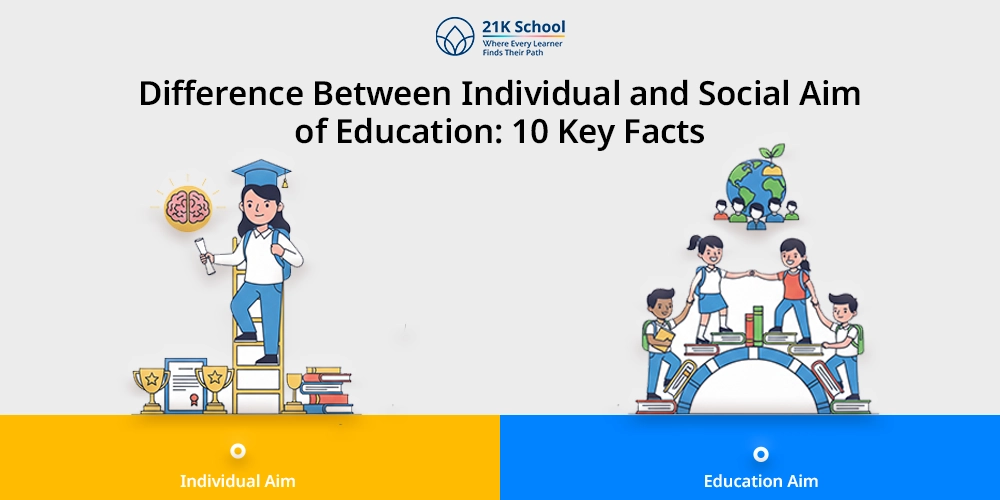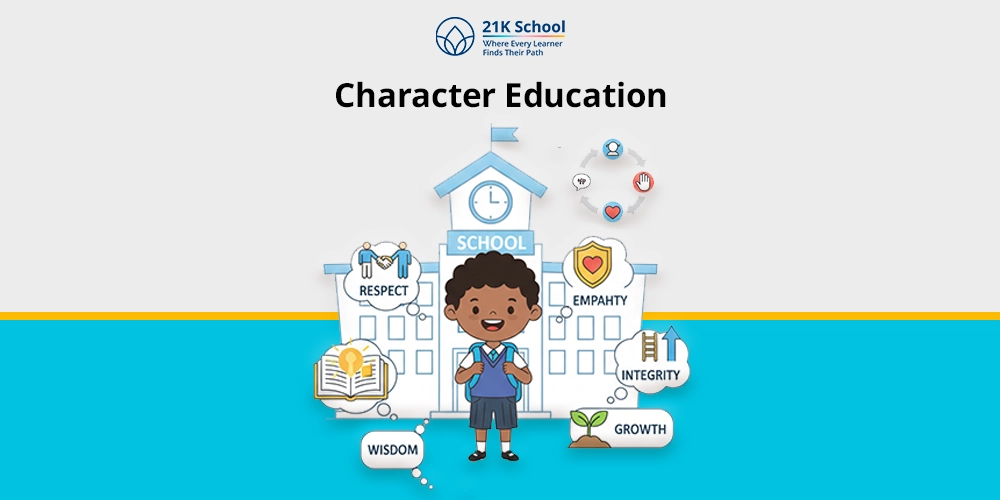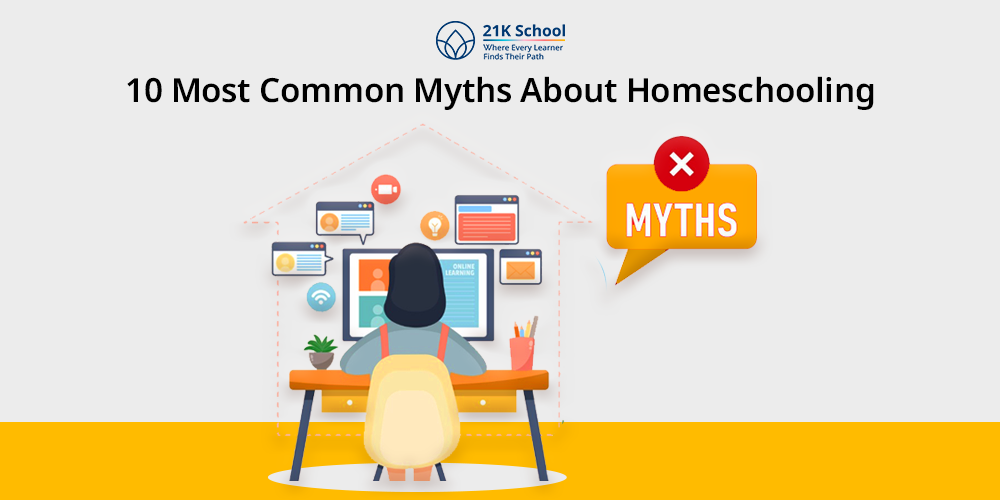
Homeschooling has become the new choice for education recently, and more parents are looking for flexible, personalised, and student-centred learning.
Even with a surge in popularity, there are tons of myths that are clouding the way the public thinks about homeschooling. These myths frequently stop parents from even finding out if it’s the best educational choice for their child.
In this blog, we’ll eliminate and explain the 10 most common myths about homeschooling, and allow you to view what homeschooling is (and isn’t) with a fresh and informed perspective.
Contents
- 10 Most Common Myths About Homeschooling
- Myth 1: Homeschooled Children Lack Social Skills
- Myth 2: Homeschooling Isn’t as Effective as Traditional Schooling
- Myth 3: Only Certified Teachers Can Teach Effectively at Home
- Myth 4: Homeschoolers Miss Out on Extracurricular Activities
- Myth 5: Homeschooling Is Only for Religious or Isolated Families
- Myth 6: Homeschooling Is Too Expensive for the Average Family
- Myth 7: Homeschooled Students Struggle to Get into Colleges
- Myth 8: Parents Need to Be Experts in Every Subject
- Myth 9: Homeschooling Leads to Gaps and Inconsistencies
- Myth 10: Homeschooling Doesn’t Prepare Kids for the Real World
- Conclusion: Rethinking Homeschooling in Today’s World
10 Most Common Myths About Homeschooling

Myth 1: Homeschooled Children Lack Social Skills
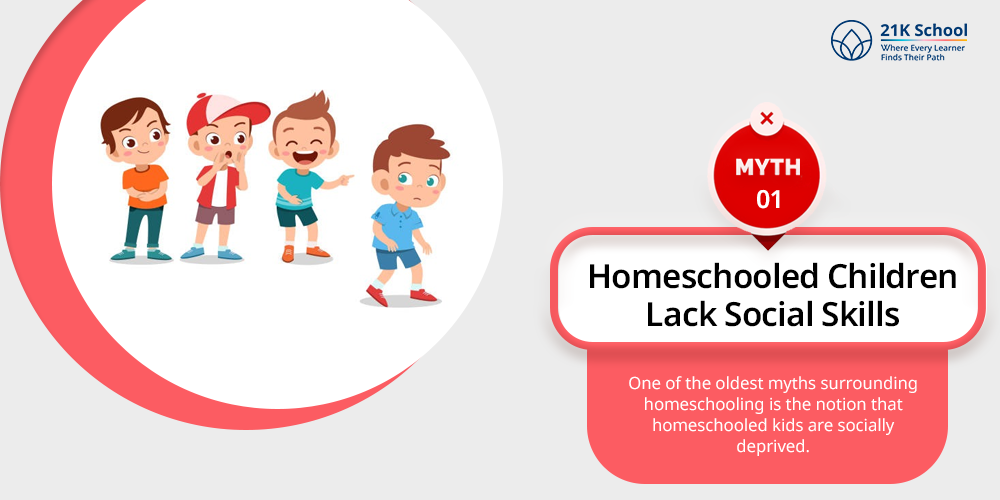
One of the oldest myths surrounding homeschooling is the notion that homeschooled kids are socially deprived.
Homeschooling and socialisation are usually not found in the same sentence in a positive sense. People assume that since they are not navigating a classroom with 30 other kids, they must not be growing socially.
The reality is quite the opposite. The opportunities for social interactions through homeschooling are vast, often different from those found in a traditional school environment, and often more meaningful.
Homeschooled children still interact daily with their peers while involved in field trips, sports, hobby clubs, community service projects, and online learning groups.
All of these experiences are teaching them how to communicate across age levels, collaborative learning, and how to interact confidently in group settings.
Myth 2: Homeschooling Isn’t as Effective as Traditional Schooling
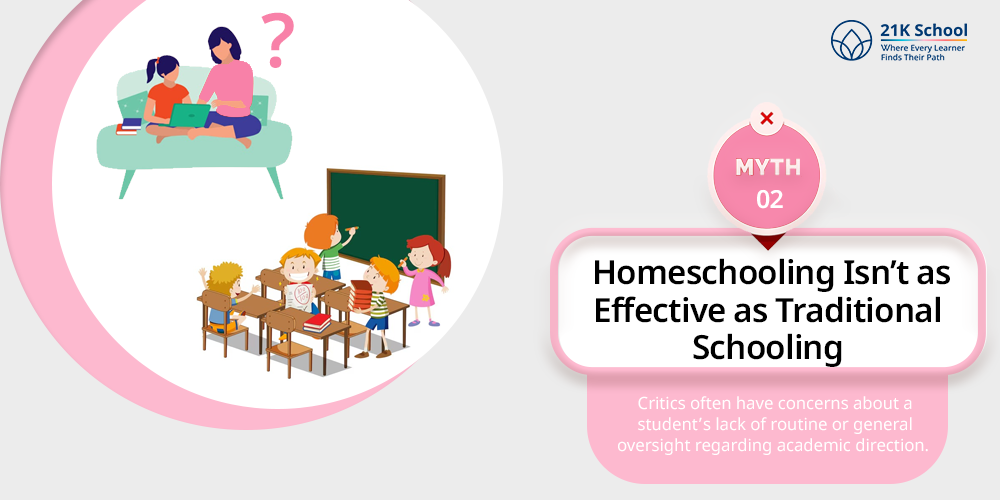
Another common misconception is that homeschooling cannot reach the academic and developmental level of regular school.
Critics often have concerns about a student’s lack of routine or general oversight regarding academic direction. But the truth is, homeschooling can be equally effective, potentially more than learning in a regular school.
Homeschooled children benefit from individualised attention, allowing them to proceed at their own pace and develop their curriculum that fits their interests and learning styles.
Research has shown that homeschooled students, on average, outperform students who attend traditional schools on standardised tests and are well-positioned for college and competitive admission testing.
Myth 3: Only Certified Teachers Can Teach Effectively at Home
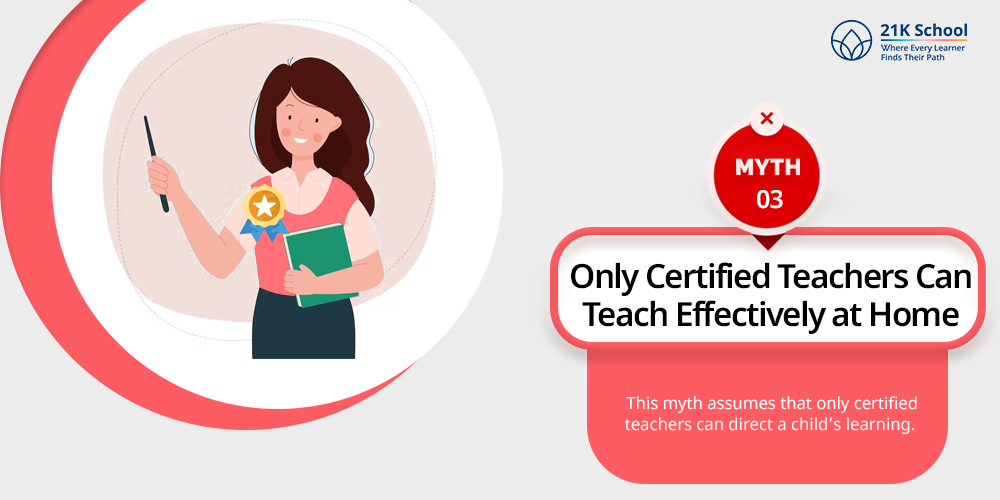
This myth assumes that only certified teachers can direct a child’s learning.
While teachers possess trained skills that can certainly contribute positively to directing learning, parents can successfully be teachers in the home when they apply the right tools and frame of mind.
Learners today have access to organised homeschooling curricula, online learning systems, webinars, and other teaching aids.
Homeschooling does not require the parent to be a subject-matter expert. They simply stay involved in the learning process.
Myth 4: Homeschoolers Miss Out on Extracurricular Activities
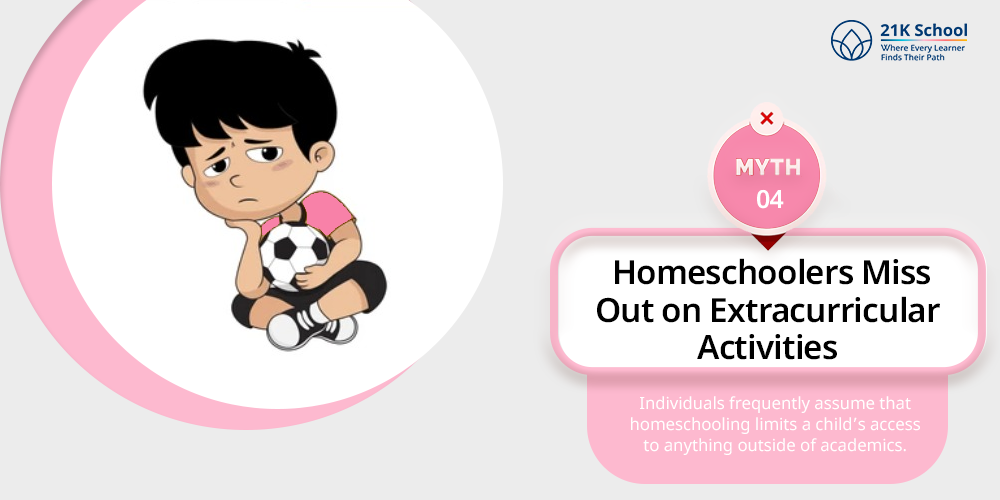
Individuals frequently assume that homeschooling limits a child’s access to anything outside of academics. However, homeschooled students often have more time and opportunities to pursue a wide variety of goals.
Whether that is sports, a musical instrument, dance, drama, coding, or any kind of entrepreneurial venture, homeschoolers can participate in any of these opportunities because of their flexible schedules.
Explore some tips for creating a homeschooling schedule.
Many homeschoolers also compete in national and international level competitions, or participate in workshops or creative projects, which develop skills beyond textbooks.
In contrast with a traditional school year, homeschooled students are usually able to explore their passions for a longer duration with regular, consistent practice, enabling them to gain higher-quality learning experiences.
Myth 5: Homeschooling Is Only for Religious or Isolated Families
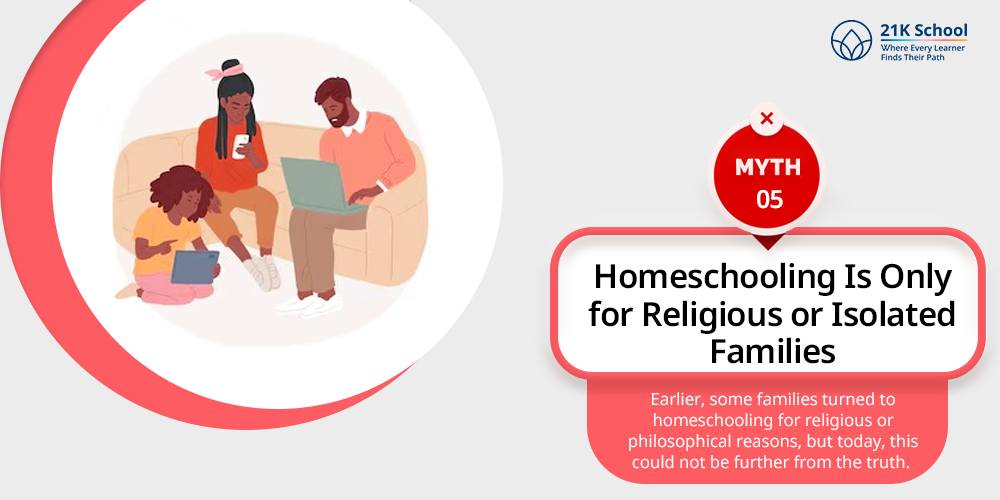
Earlier, some families turned to homeschooling for religious or philosophical reasons, but today, this could not be further from the truth.
The choice to homeschool is being made by families everywhere – urban, rural, public, private, and for an endless list of reasons; academic flexibility, health issues, wealthy travel lifestyles, special needs, lack of satisfaction with local schools, just to name a few.
Recent technology and global online schools have levelled the playing field even more by making homeschooling an acceptable, increasingly popular, and viable option for families.
It is as realistic as ever for working parents and expats, digital nomads, or anyone who simply wants to create a high-quality and flexible educational experience.
Myth 6: Homeschooling Is Too Expensive for the Average Family
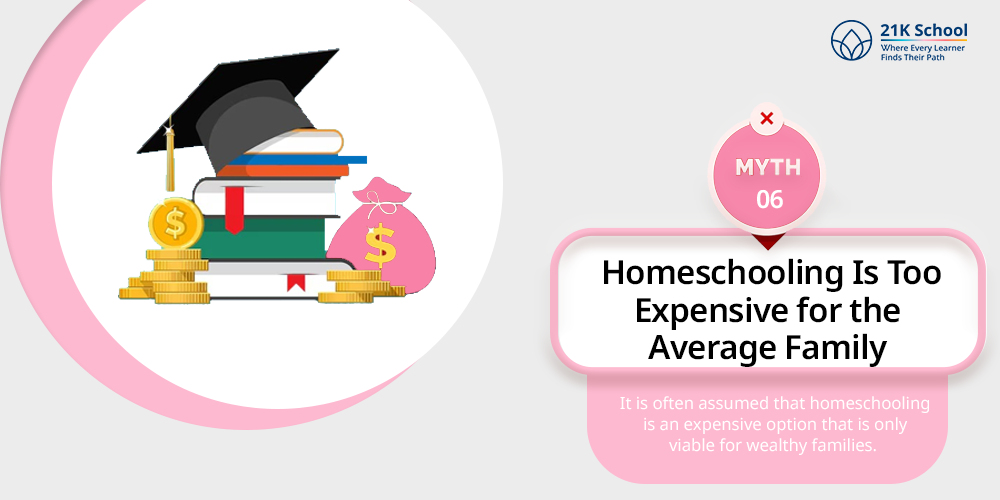
It is often assumed that homeschooling is an expensive option that is only viable for wealthy families. Fortunately, homeschooling can be done on a budget and is often found to be less expensive than private schooling.
There are many free and low-cost options and resources available, including online programs that are recognised by the government, open-source curriculum, and inexpensive learning tools.
Many online schools and programs offer affordable, structured online schooling in a way that takes into account a cost-effective approach, cover their children’s academic and extracurricular learning for a year or more, while creating a safeguard against the rising costs of public high school fees, transportation, uniforms, sport associations, and more.
Some families may spend more than others on homeschooling (for example, branded curriculum books or educational trips), but ultimately, they can decide how much they want to spend on their child’s learning, which makes it an achievable option for most families that want to spend more time together.
Myth 7: Homeschooled Students Struggle to Get into Colleges
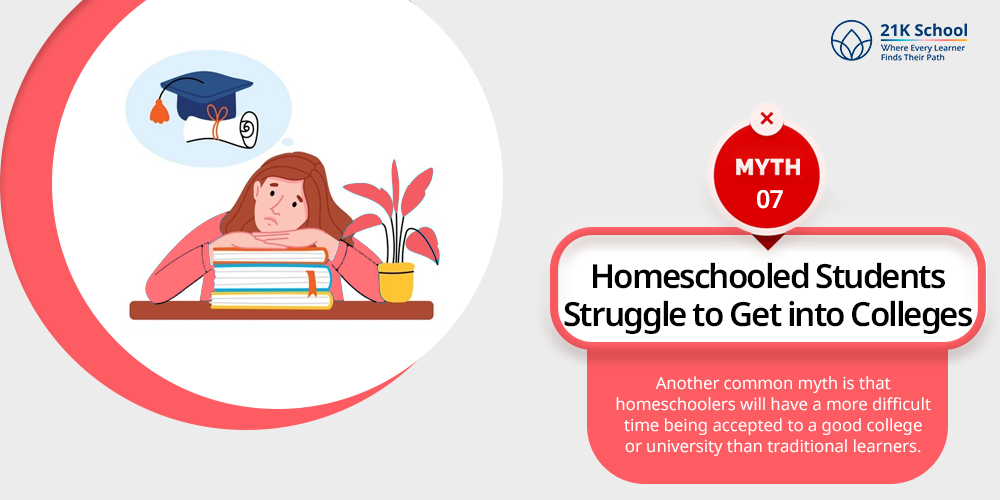
Another common myth is that homeschoolers will have a more difficult time being accepted to a good college or university than traditional learners.
But in reality, a plethora of admissions offices across the globe will gladly accept homeschoolers as students. Many homeschool students go on to develop academic and educational success in their respective areas of interest.
Admissions would typically acknowledge and appreciate the independent learning skills and critical thinking that homeschooled applicants bring to the table.
As long as students keep accurate academic records (and transcripts) and can provide proof of having completed entrance requirements into their respective colleges or universities, there is no advantage or disadvantage based on being homeschooled.
Many of the world’s best schools in the US, UK, India and elsewhere have established policies and practices to give homeschooled students a fair opportunity and strong chances to prove their merit and motivation to be accepted.
Myth 8: Parents Need to Be Experts in Every Subject
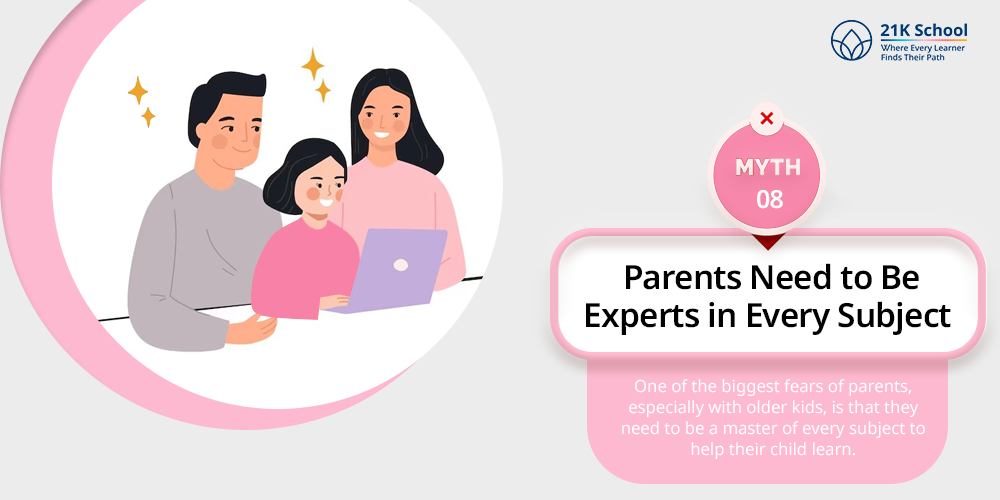
One of the biggest fears of parents, especially with older kids, is that they need to be a master of every subject to help their child learn.
But, thanks to the digital age, they can now outsource subject-specific learning, rather than delivering their child’s education entirely themselves.
Online schools provide different teachers for different subjects and assessments, which helps with personalised education.
Myth 9: Homeschooling Leads to Gaps and Inconsistencies
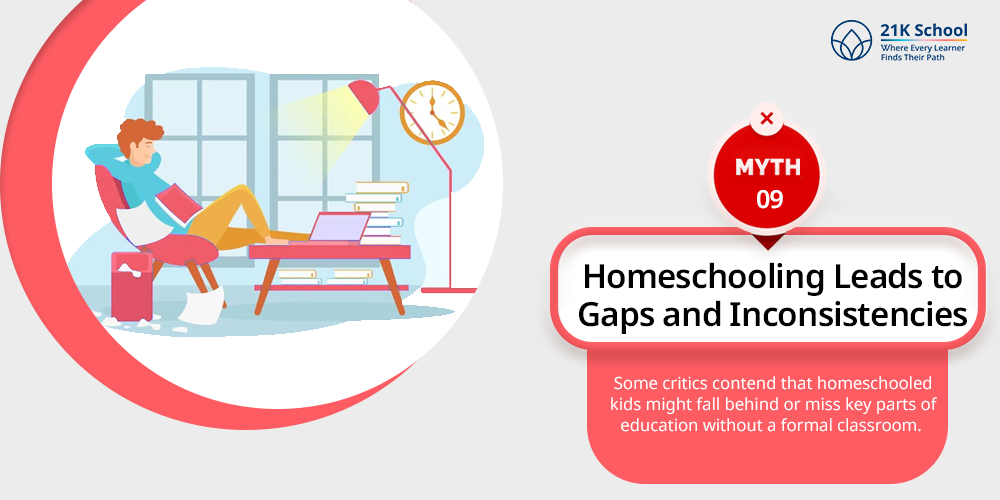
Some critics contend that homeschooled kids might fall behind or miss key parts of education without a formal classroom.
This happens without structure, but modern homeschooling is often organised and evaluated with outcomes in mind.
Learn how to evaluate a homeschool student’s progress.
Modern evaluation tools include standardised assessments, direct/indirect assessments, and teacher feedback. Accredited online schools have clear academic pathways aligned with national or international standards.
Parents today can access high-quality educational programs and be assured that their child’s education is well-rounded, complete, balanced, and on par with traditional schooling.
Myth 10: Homeschooling Doesn’t Prepare Kids for the Real World
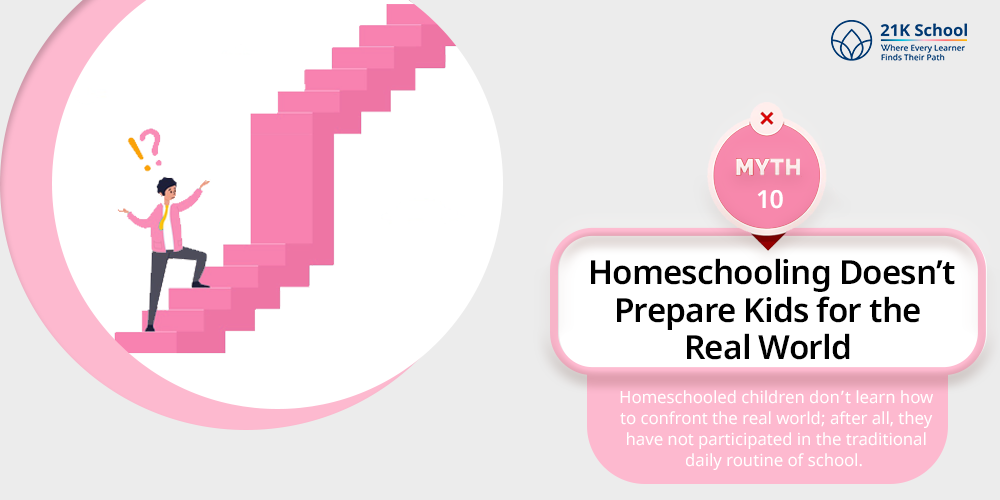
Another misconception is that homeschooled children don’t learn how to confront the real world; after all, they have not participated in the traditional daily routine of school.
However, when living outside the academic lifestyle, homeschooled children often learn better how to prepare for life outside of academics.
For example, homeschooled children will learn how to manage their own time, develop problem-solving skills, and acquire practical knowledge.
Many take on internships, volunteer, create art, or establish small businesses when they are much younger.
They often graduate exhibiting a solid degree of self-motivation, curiosity, and emotional intelligence – all of which are vital skills needed to tackle the real world.
Conclusion: Rethinking Homeschooling in Today’s World
Homeschooling isn’t about separating kids from learning. It’s about allowing children to learn in a positive learning environment and supporting them through their learning process.
As can be seen, most ideas surrounding homeschooling are based on outdated ideas that are hardly pertinent anymore in the interconnected and resource-rich world that we live in.
With the right support, structure, and community, homeschooling can be a rich and empowered learning experience for children and their parents.
Due to the rising number of online schools, homeschooling is now easier to implement, even amongst diverse learning differences. Now, families no longer need to sacrifice flexible schooling for quality education.

